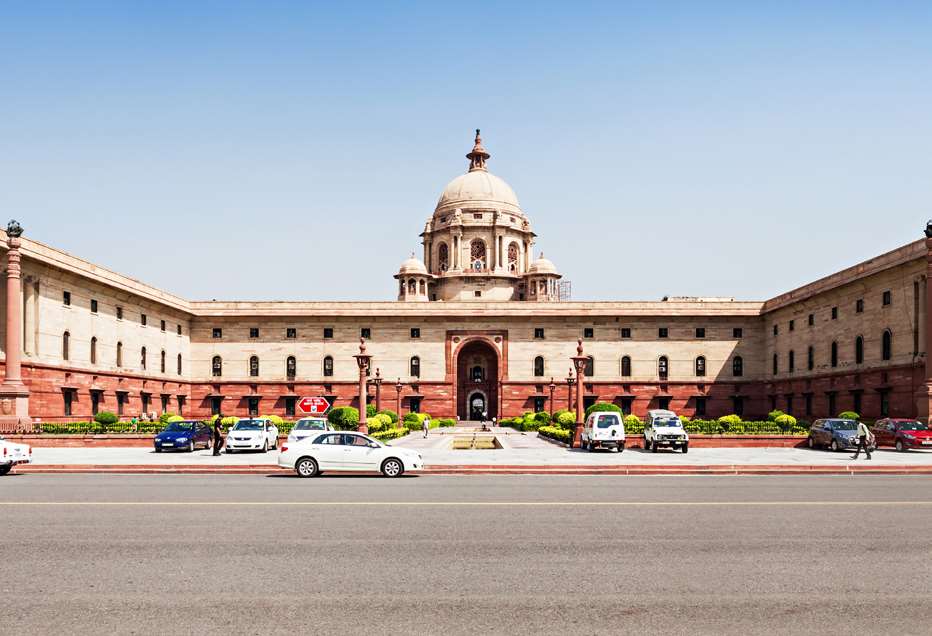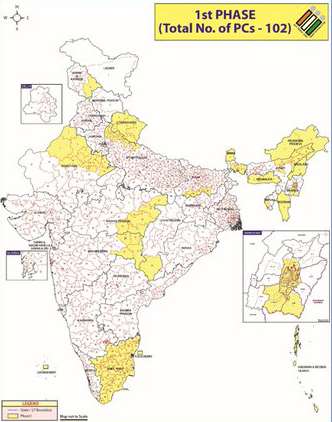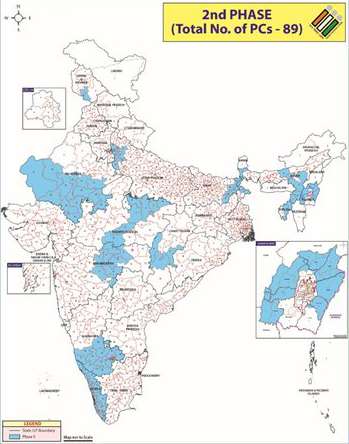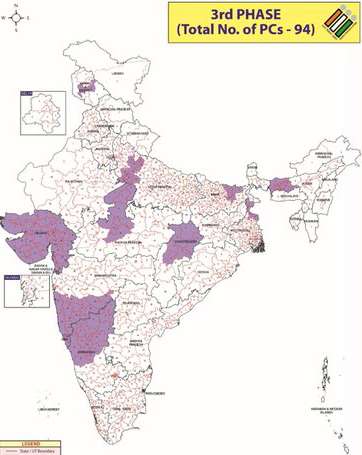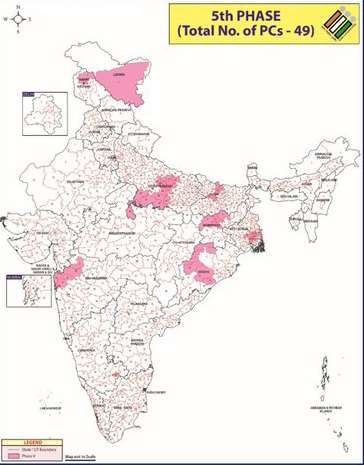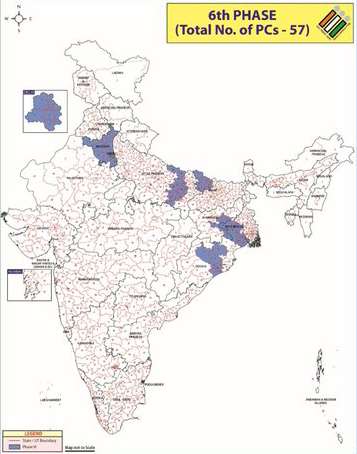The Election Commission of India (ECI) has announced the 2024 General Elections in India to elect 543 members of the 18th Lok Sabha, as the tenure of the 17th Lok Sabha is set to conclude on 16 June 2024. With voting scheduled across seven phases from 19 April to 01 June 2024 and counting slated for 04 June 2024, the elections will determine the direction of India’s domestic policies and geopolitical standing. Concurrently, elections for State Legislative Assemblies of Andhra Pradesh, Arunachal Pradesh, Odisha, and Sikkim will take place. Additionally, by-elections are scheduled in Bihar, Gujarat, Haryana, Jharkhand, Uttar Pradesh, Karnataka, Tamil Nadu, and Tripura. With approximately 97 crore registered voters, this election marks the world’s largest democratic exercise, necessitating comprehensive security and logistical arrangements.
As political parties gear up for the polls, national parties like the Bharatiya Janata Party (BJP) and the Congress Party have already begun announcing their candidates, signalling the onset of intense campaigning and strategising. However, amidst the electoral fervour, security concerns loom large on the domestic front. Issues such as ethnic and communal tensions, as evidenced by the recent unrest in Manipur, pose significant challenges to ensuring peaceful polling processes across the diverse Indian landscape. Further the ongoing debates surrounding contentious issues like the Citizenship Amendment Act (CAA) and agrarian unrest further underscore the complexities of India’s electoral terrain. Moreover, the electoral timeline coincides with a period of global democratic activity, with nations like the United States, Brazil, and various African states undergoing similar exercises. Consequently, India’s elections and the navigation of geopolitical complexities, such as the evolving China threat and shifting global dynamics, will be closely monitored by the international community.
It is therefore imperative for businesses operating in the region to stay informed about the evolving political landscape and its potential implications on security concerns to ensure the safety of employees, assets, and operations.
Important Information
- Polling- 07 phases – 19 April to 01 June 2024
- Counting of votes- 04 June 2024
- Voting time- Usually, the voting period is between 0700-1800 hours. However, the Election Commission of India may adjust polling hours in areas with challenging geography, security issues, high voter turnout, or logistical constraints.
- Number of electoral constituencies- 543
- Number of voters- 96.8 crore
- Polling stations- approximately 10.5 lakh polling stations. To know your polling booth call Voter Helpline: 1950 or refer to the EC website (https://electoralsearch.eci.gov.in/pollingstation).
Detailed Schedule Map
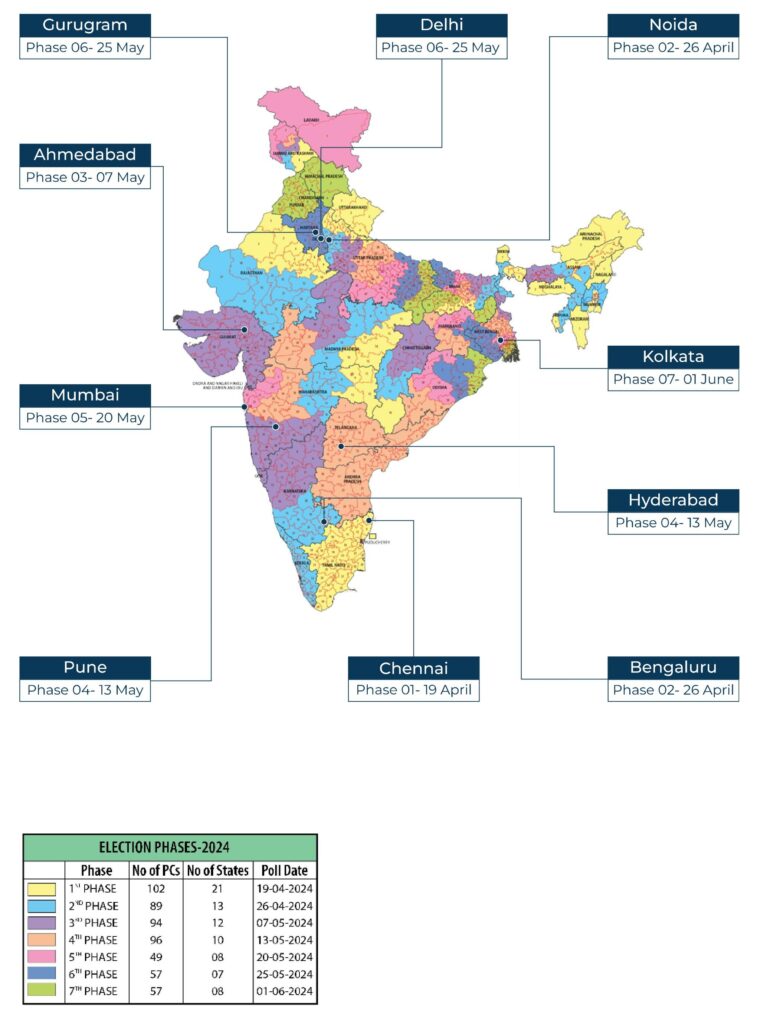
Detailed Election Schedule
At a Glance :
Single Day Polling:
Arunachal Pradesh, Andaman & Nicobar Islands, Andhra Pradesh, Chandigarh, Daman and Diu and Dadra and Nagar Haveli, Delhi, Goa, Gujarat, Himachal Pradesh, Haryana, Kerala, Lakshadweep, Ladakh, Mizoram, Meghalaya, Nagaland, Puducherry, Sikkim, Tamil Nadu, Punjab, Telangana, and Uttarakhand.
Two Days Polling:
Karnataka, Rajasthan, Tripura and Manipur.
Three Days Polling:
Chhattisgarh and Assam.
Four Days Polling:
Odisha, Madhya Pradesh and Jharkhand.
Five Days Polling:
Maharashtra and Jammu & Kashmir.
Seven Days Polling:
Uttar Pradesh, Bihar and West Bengal.

Elaborate Schedule :
Phase 1:
- Polling Date: 19 April
- Counting Date: 04 June
- To be completed before: 06 June
- Polling Areas:Uttarakhand, Northern Uttar Pradesh, Northern Rajasthan, Southeastern Madhya Pradesh, Eastern Maharashtra, Tamil Nadu, Puducherry, Mizoram, Southern Tripura, Sikkim, Southern Bihar, Eastern Assam, Nagaland, Arunachal Pradesh, Southern Jammu and Kashmir, and Southern Manipur.
- Detailed Map: https://twitter.com/ECISVEEP/status/1768946041402093825
Phase 2:
- Polling Date: 26 April
- Counting Date: 04 June
- To be completed before: 06 June
- Polling Areas:South-Eastern Jammu & Kashmir, Eastern Uttar Pradesh, Southern Rajasthan, Eastern Maharashtra, Central Madhya Pradesh, Southern Chhattisgarh, Eastern Bihar, Northern West Bengal, Northern Tripura, Central and Southern Assam, North, Eastern and Western Manipur.
- Detailed Map: https://twitter.com/ECISVEEP/status/1768946041402093825
Phase 3:
- Polling Date:07 May
- Counting Date: 04 June
- To be completed before: 06 June
- Polling Areas:Central Jammu & Kashmir, parts of Central Uttar Pradesh, Northern Madhya Pradesh, Northern Chhattisgarh, Gujarat, Southern Maharashtra, Northern Karnataka, parts of Northern West Bengal, North-Eastern Bihar, and Western Assam.
- Detailed Map: https://twitter.com/ECISVEEP/status/1768946041402093825
Phase 4
- Polling Date:: 13 May
- Counting Date: 04 June
- To be completed before: 06 June
- Polling Areas:Northern Jammu & Kashmir, Central Uttar Pradesh, Western Madhya Pradesh, Central Maharashtra, Telangana, Andhra Pradesh, Southern Odisha, Central Bihar, Western parts of Jharkhand, and parts of Central West Bengal.
- Detailed Map: https://twitter.com/ECISVEEP/status/1768946041402093825
Phase 5:
- Polling Date: 20 May
- Counting Date: 04 June
- To be completed before: 06 June
- Polling Areas:Southern Ladakh, Northern Jammu & Kashmir, Central to Southern Uttar Pradesh, parts of Northern Bihar, Northern Jharkhand, East West Bengal, Central Odisha, and parts of Western Maharashtra.
- Detailed Map: https://twitter.com/ECISVEEP/status/1768946041402093825
Phase 6
- Polling Date: 25 May
- Counting Date: 04 June
- To be completed before: 06 June
- Polling Areas:Delhi, Haryana, Eastern Uttar Pradesh, North-Western Bihar, Southern West Bengal, Eastern Odisha, and parts of Eastern Jharkhand
- Detailed Map: https://twitter.com/ECISVEEP/status/1768946041402093825
Phase 7
- Polling Date: 01 June
- Counting Date: 04 June
- To be completed before: 06 June
- Polling Areas:Punjab, Chandigarh, Himachal Pradesh, Eastern Odisha, Southeastern West Bengal, Northeastern Jharkhand, Southwestern Bihar and Eastern end of Uttar Pradesh.
- Detailed Map: https://twitter.com/ECISVEEP/status/1768946041402093825
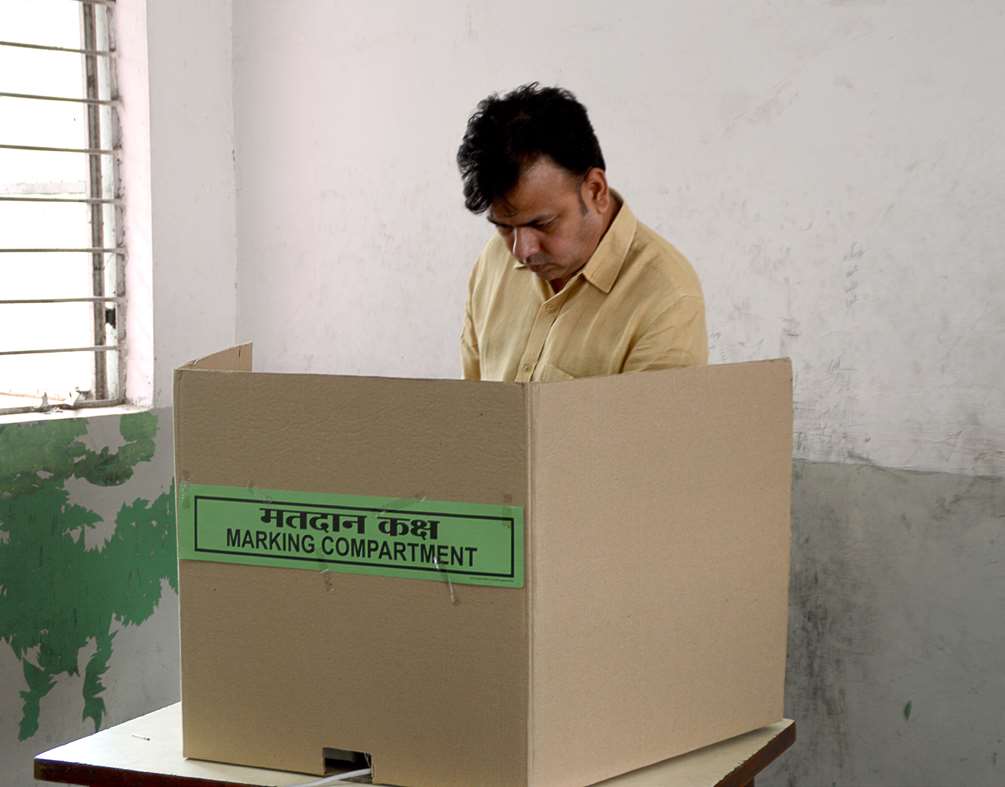
Identification Documents Required for Voting
Eligible voters are issued an Elector Photo Identity Card (EPIC) by the EC, which serves as the primary identification document. Further, it is advised to carry one of the other official photo identity documents such as a passport, driving licence, PAN card, MGNREGA job card, or AADHAAR card.
What is Not Allowed in Polling Stations?
- Electronic devices such as mobile phones, cameras, and laptops.
- Weapons or any sharp objects.
- Campaign materials promoting specific candidates or parties.
- Any form of propaganda or election-related materials.
- Food and drinks, except in specific circumstances.
- Any items deemed disruptive or potentially influencing the voting process.
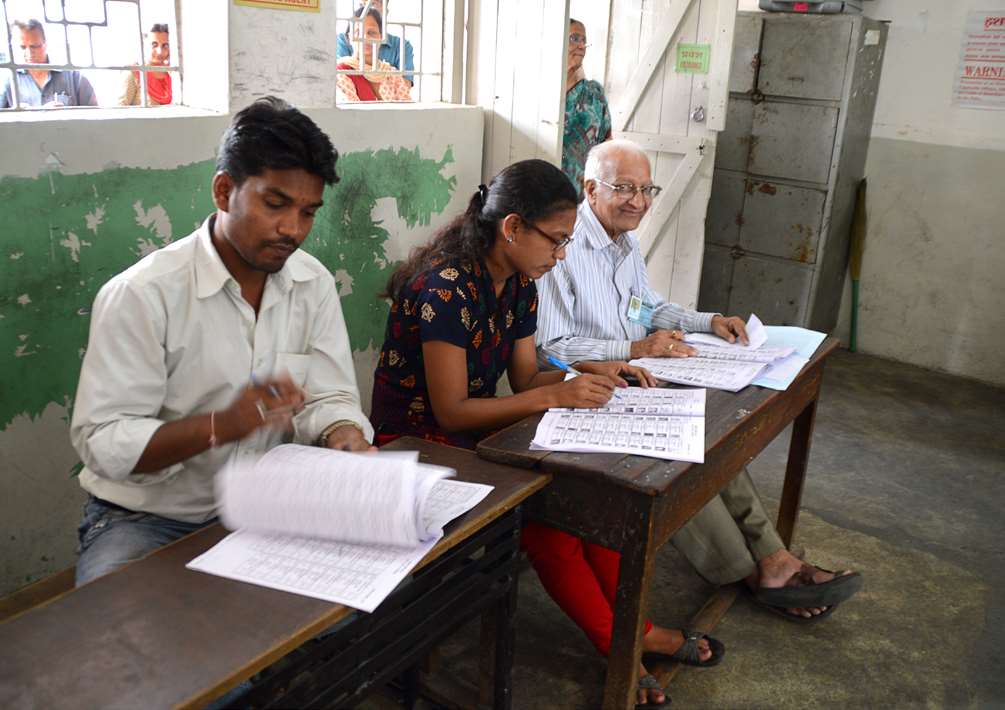
Security Measures Observed During Elections
| Pre-poll | During Elections | Post-poll |
| Deployment of security forces to sensitive areas and regions prone to electoral violence or unrest. | Deployment of security personnel at polling stations to maintain order and ensure voter safety. | Continued vigilance and security presence to prevent any post-election violence or attempts to manipulate the results. |
| The ECI has decided to deploy a maximum of around 3,400 companies of the Central Armed Police Forces (CAPFs). The distribution of CAPF companies is as follows: West Bengal (920), Jammu and Kashmir (635), Chhattisgarh (360), Bihar (295), Uttar Pradesh (252), Andhra Pradesh (250), Jharkhand (250), Punjab (250), Gujarat (200), Manipur (200), Rajasthan (200), Tamil Nadu (200), Odisha (175), Assam (160), Telangana (160), Maharashtra (150), Madhya Pradesh (113), Tripura (100). | Conducting area domination exercises to deter any attempts at disrupting the voting process. | Swift response to any incidents of violence, electoral malpractice, or violations of the law. |
| Conducting security assessments and intelligence gathering to identify potential threats. | Coordination between local law enforcement agencies, paramilitary forces, and election officials to address any security concerns promptly. | Securing electronic voting machines (EVMs) and ensuring their safe storage until the votes are counted. |
| Implementation of preventive measures such as imposing Section 144, area patrolling, check-posts, and surveillance. | Escorting EVMs and polling personnel to and from polling stations to safeguard against tampering or theft. | Collaboration with law enforcement agencies and intelligence services to investigate any allegations of electoral fraud or misconduct. |
| Heightened security vigilance, including road closures and traffic restrictions, may be implemented around anticipated major political rallies or public meetings. | Section 144 limiting assembly of four or more people and restrictions on movement may be imposed around polling booths or in certain areas for security concerns. | Elaborate traffic arrangements for managing traffic in case of post-poll protests or victory rallies. |
Major Upcoming Events and Hotspots of Political Activities
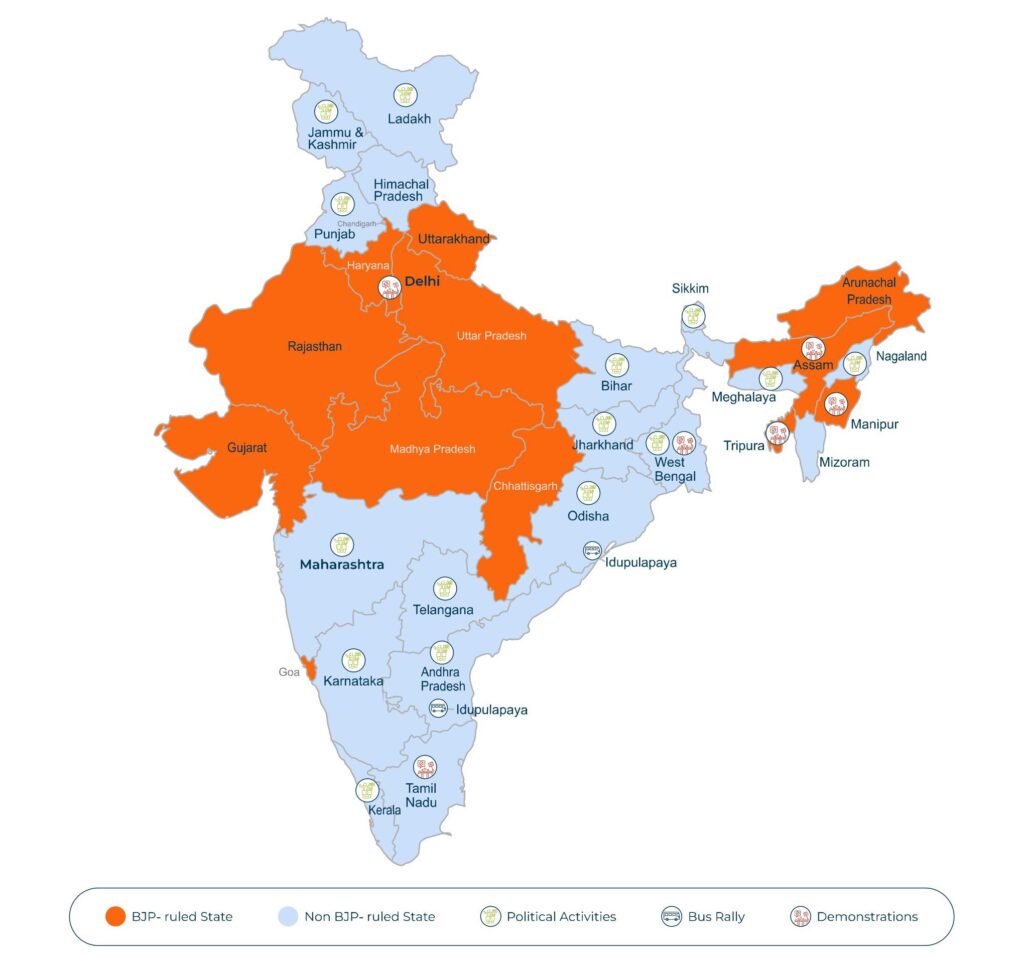
- 26/27 March-16 April: The YSR Congress Party (YSRCP) President and Chief Minister Y.S. Jagan Mohan Reddy will undertake a 21-day bus yatra (rally) from Idupulapaya to Ichapuram from 26/27 March covering all the Lok Sabha constituencies.
- Intense political activities and rallies are also anticipated in non-BJP ruled areas like Jammu and Kashmir, Ladakh, Himachal Pradesh, Punjab, Bihar, Jharkhand, West Bengal, Sikkim, Meghalaya, Nagaland, Mizoram, Odisha, Andhra Pradesh, Telangana, Tamil Nadu, Kerala, Karnataka, Maharashtra, and Delhi.
- Increased demonstrations remain likely in Delhi, West Bengal, Tamil Nadu, West Bengal, Assam, Tripura, and Manipur.
Key Issues and High Impact Areas
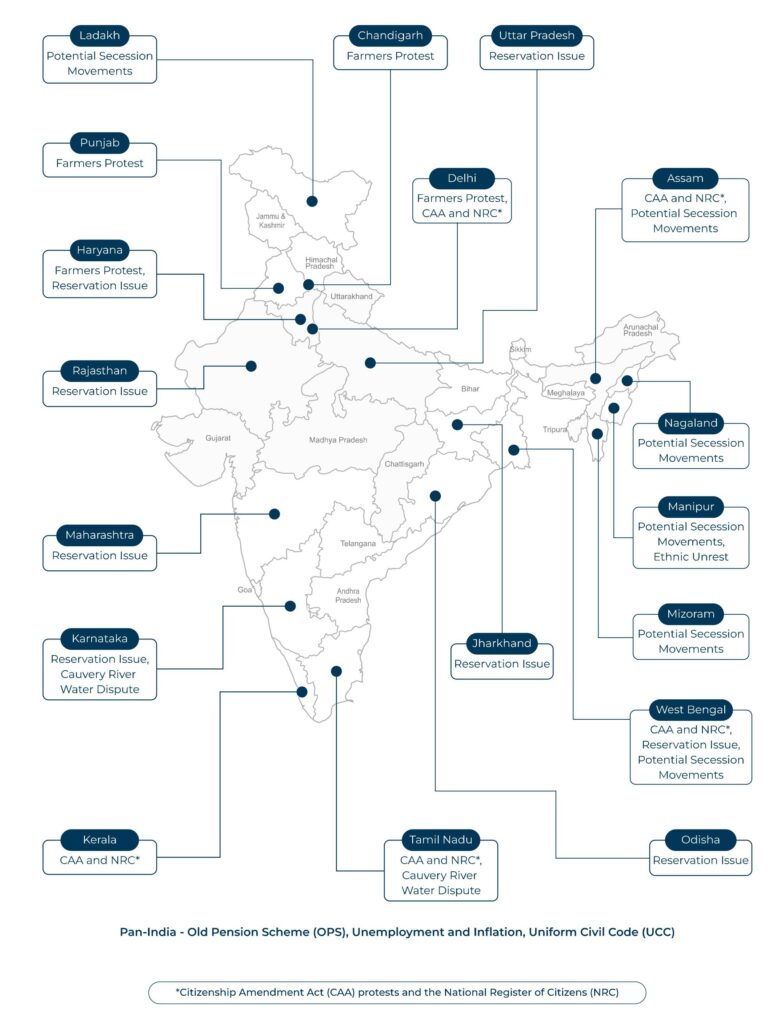
Areas That Witnessed Poll-Violence in the Past
| State/UTs | Vulnerable Areas |
| Andhra Pradesh | Guntur, Anantapur, Alluri Sitharama Raju, East Godavari, Parvathipuram Manyam, Srikakulam, Visakhapatnam |
| Bihar | Munger, Saran, Arrah, Aurangabad, Banka, Gaya, Jamui, Kaimur, Lakhisarai, Nawada, Rohtas, West Champaran |
| Chhattisgarh | Balrampur, Bastar, Bijapur, Dantewada, Dhamtari, Gariyaband, Kanker, Kondagaon, Mahasamund, Narayanpur, Rajnandgaon, Sukma, Kabirdham, Mungeli |
| Jharkhand | Bokaro, Chatra, Dhanbad, Dumka, East Singhbhum, Garhwa, Giridih, Gumla, Hazaribagh, Khunti, Latehar, Lohardaga, Palamu, Ranchi, Saraikela-Kharsawan, West Singhbhum |
| Jammu and Kashmir | Anantnag, Srinagar, Baramulla, Kupwara, Pulwama, Shopian |
| Madhya Pradesh | Balaghat, Mandla, Dindori, Bhopal, Gwalior |
| Maharashtra | Gadchiroli, Gondia, Mumbai, Pune |
| Meghalaya | Eastern West Khasi Hills, Shella in East Khasi Hills and Mokaiaw in West Jaintia Hills. |
| Nagaland | Mon district, Tuyi, Bhandari, Kohima, Wokha, Chukitong |
| Odisha | Malkangiri, Koraput, Kalahandi, Rayagada, Kandhamal, Nuapada, Bargarh, Bolangir, Sundargarh, Cuttack, Puri |
| Telangana | Adilabad, Bhadradri-Kothagudem, Jayashankar-Bhupalpally, Komaram-Bheem, Mancherial, Mulugu, Hyderabad, Nizamabad |
| West Bengal | Jhargram, Murshidabad, Malda, North 24 Parganas |
| Kerala | Malappuram, Palakkad, Wayanad, Kannur |
| Tamil Nadu | Cuddalore, Kancheepuram, Kannayakumari,Chennai, Coimbatore |
| Delhi | East Delhi and North Delhi |
| Assam | Dibrugarh, Goalpara, Darrang, Silchar, Tezpur, Jorhat, Kokrajhar |
| Gujarat | Surat, Ahmedabad |
| Haryana | Rohtak, Hisar |
| Karnataka | Dakshina Kannada, Mangaluru city, Udupi, Uttara Kannada, Belagavi |
| Manipur | Churachandpur, Imphal East |
| Tripura | West Tripura |
| Uttar Pradesh | Azamgarh, Amethi, Pratapgarh |
Potential Disruptions
Pre-poll
- The model code of conduct (MCC), enforced since the announcement of elections on 16 March, will be in effect until the end of the electoral process. As part of the same, authorities may set up Integrated Check Gates to intensify checks and prevent the presence of illegal arms, alcohol, and cash.
- Rallies and election campaigns can lead to road closures and increased traffic congestion, causing delays in the delivery of goods and disruption to supply chains.
- Businesses may need to invest in additional security measures as risk of vandalism runs high ahead of elections.
- Authorities commonly enforce Section 144, especially around nomination filing centres and polling stations, prior to and during elections to maintain law and order. Additionally, cautionary measures such as curfews or internet suspensions may be implemented, if required.
- Various civil, farmer, labour, and student groups may stage protests over grievances in the lead-up to elections, posing potential security risks.
- The risk of extremism, including terror threats and Naxal violence, typically escalates before elections, prompting heightened police patrols and increased vigilance at key intersections, vulnerable areas and at inter-state borders.
- Large gatherings and potential unrest associated with political rallies and events pose risk of escalation.
- The transportation of cash and gold in significant quantities is often suspended to combat corrupt practices, potentially impacting the banking and retail sectors.
- Increased security measures and checks at airports and other public transport hubs, such as railway stations and bus stations, may result in long queues at checking gates.
During Elections
- As voting days are usually declared paid holidays, offices may face operational disruptions on certain dates, as they enable employees to vote.
- Offices or organisations situated near polling stations may experience traffic disruptions due to heightened security measures.
- Traffic congestion around polling stations might cause delays in the transportation of goods and services, affecting delivery schedules.
- Businesses operating in sensitive areas may need to implement additional security measures to ensure the safety of customers, employees, and assets amidst heightened political tensions.
- Limited access to certain areas or road closures enforced by authorities for security reasons may hinder the movement of employees, customers, and goods.
- Communication disruptions, such as internet or mobile network slowdowns or outages, may occur as a precautionary measure by authorities, affecting online operations or customer interactions.
Post-poll
- Anticipate rallies by supporters of the winning party and demonstrations by members/supporters of opposition parties, especially near party headquarters.
- Heightened security measures remain likely until the completion of polling activities. Subsequent disruptions to traffic in the form of restrictions, diversions, and congestion are anticipated.
- Potential unrest or protests following election results may pose safety risks for businesses, necessitating heightened security measures.
- Supply chain management will be crucial as risk of deliberate damage or theft cannot be ruled out. In the event of post-election violence, delays in supply chains may occur. Suppliers may face challenges in delivering raw materials or finished products, impacting overall production.
- Potential market fluctuations following election results can impact investor confidence and financial markets.
- Long-term: Changes in government can lead to shifts in regulatory policies including potential changes in taxation, industry policies etc. This may require strategic adjustments and contingency planning.
Recommendations
Pre-poll
- Given the phased nature of voting and the designation of voting days as holidays, it is advised to undertake suitable contingency measures like avoiding onsite/physical meetings and critical events or team outings on these days. Further implementing measures such as remote working can be considered to avoid incidental risks.
- Employees may have to travel to home town to cast votes, advised to plan the work schedule accordingly.
- Recommended to reach the airport or other public transport hubs, such as railway stations and bus stations, well in advance due to increased security measures and checks.
- Provide transportation facilities, especially for female employees, before and after the polls due to security concerns.
- Arrange for adequate backups to address potential unscheduled blackouts or power outages.
- Considering the extensive security arrangements, supply chain disruptions cannot be ruled out. Advised to plan for delays while confirming or placing orders.
- Advised to safeguard business premises and valuable assets with reinforced security measures including additional deployment of CCTV cameras and security patrols.
- Establish a crisis management team and assign specific roles and responsibilities for handling emergency situations.
- Provide training sessions for employees on emergency procedures, including evacuation protocols and communication channels.
- Implement access control measures to restrict unauthorised entry into business premises.
- Review and update emergency contact lists for employees, clients, and relevant authorities.
- With a surge in cybersecurity intrusions ahead of national elections, it is recommended to secure electronic devices and sensitive information through encryption or password protection.
During Elections
- If operating near a polling booth, have an emergency exit plan in place. Ensure that exits are clear and visibly marked for all and undertake simulations involving all employees.
- Carry valid identification documents and proof of employment while travelling to facilitate expedited passage through security checkpoints and roadblocks.
- Avoid engaging in political debates in public areas or on social media platforms to mitigate the risk of confrontation or hostility from individuals with opposing views.
- Exercise caution when using public transportation or shared ride services, particularly during peak hours or in areas with a history of civil unrest or security incidents.
- Carry a portable charger or power bank for electronic devices to ensure continuous communication and access to emergency services during prolonged disruptions to power or communication networks.
- Refrain from sharing personal or sensitive information including political inclinations with strangers or unfamiliar individuals, especially in crowded or unfamiliar environments and near polling stations, to minimise the risk of identity theft or fraud.
- Remain vigilant and promptly report any suspicious activities or objects to the appropriate authorities.

Post-poll
- Prepare for traffic disruptions due to celebratory rallies organised by winning political parties.
- Promptly document incidents for potential insurance claims or legal purposes following any unrest or disturbances occurring during or after the elections.
- Collaborate with local authorities and community leaders to address any post-election tensions.
- Monitor reliable channels for any potential signs of post-election unrest or protests, and take proactive measures to mitigate risks and ensure business continuity.
- Conduct a comprehensive review of security protocols and procedures to identify areas for improvement and notable challenges.
| Do’s | Don’ts |
| Do report any suspicious activities or irregularities observed during the election process to the appropriate authorities. | Do not accept bribery or engage in any form of electoral fraud or misconduct, such as voter impersonation or ballot tampering. |
| Do cross-check information from multiple credible sources, such as official government websites or reputable news outlets, to ensure its accuracy | Avoid forwarding any election related messages or information without verifying with official sources |
| Exercise and secure your voting rights without disrupting the rights of others. | Avoid openly favouring or criticising political ideologies or avoid wearing clothing or accessories that could be associated with any political affiliation to minimise the risk of being targeted during protests or demonstrations |
| Be accommodative of others’ opinions and identities. | Refrain from commenting on anyone’s identity based on their culture or religion. |
| While travelling or visiting office, keep emergency numbers on speed dial and check the traffic situation on Google Maps before commencing travel. | Do not drive/travel through areas that are marked Red in Google Maps. It is possible that those routes are witnessing rallies. |
| Plan your travel in advance, considering potential traffic disruptions due to political rallies and demonstrations | Avoid non-essential travel to areas prone to poll violence. |
| Carry proper vehicle documents as security checks get stringent during elections. | Refrain from engaging in unlawful or disruptive behaviour that could trigger controversy. |
| Follow all security protocols and cooperate with security personnel at transportation hubs and other public areas | Avoid carrying or possessing any prohibited items or weapons in public areas, as this could lead to legal consequences |
Emergency Contacts and Sources
- Police- 100
- Fire- 101
- Ambulance- 108
- Emergency- 112
- Tourist Helpline – 1363
- Women Helpline – 1091
- Senior Citizen Helpline – 14567
- Election Commission of India (ECI) Helpline: 1950
- To authenticate any election related information, refer to ECI social media handles- https://www.facebook.com/ECI/ or https://twitter.com/SpokespersonECI
- For details and downloading e-EPIC Card, refer to – https://old.eci.gov.in/e-epic/
- cVigil App download – Google Store; Apple Store
- KYC-ECI App download – Google Store; Apple Store
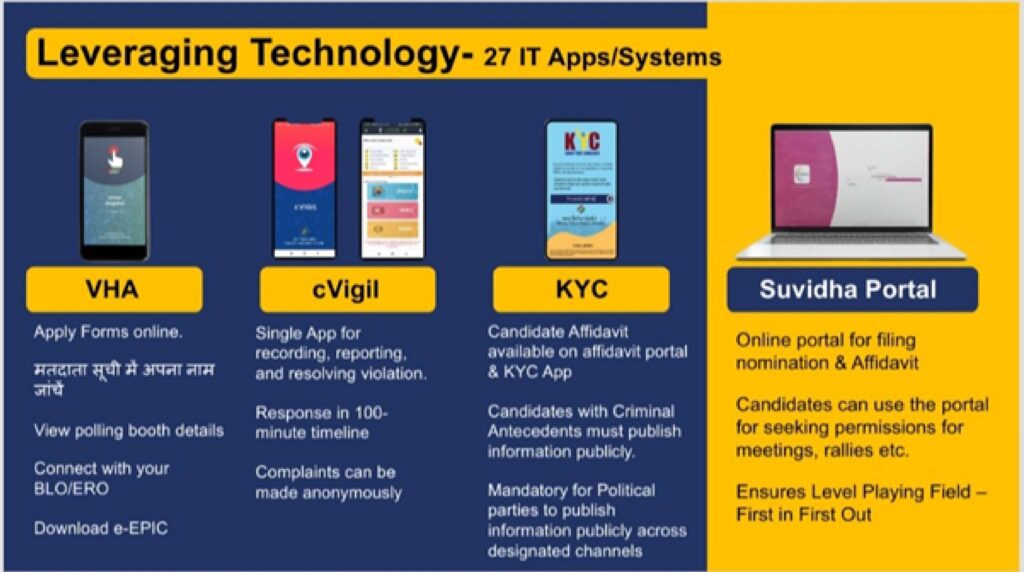
Source: Election Commission of India
